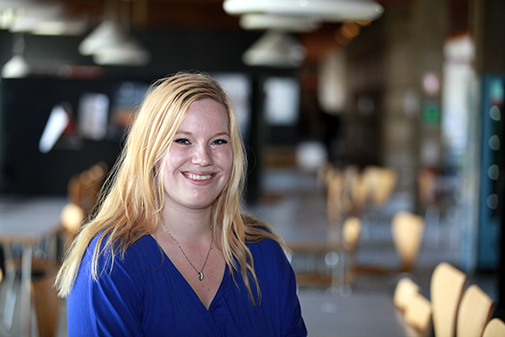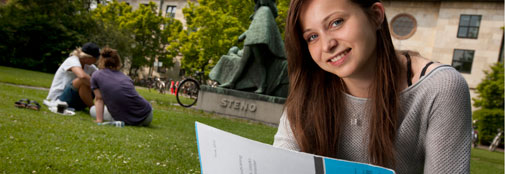Testimonials
Read interviews with students from the Master of Science programme (MSc) in Mathematics-Economics:'
“It’s a great degree programme. It’s very mathematically intense, so we end up with some really good skills. We have special expertise,” says Lea Nøhr Hjelmager Hansen, who holds a BSc in Mathematics-Economics and decided to do a master’s degree in the same discipline.

Why did you choose to do Mathematics-Economics?
During my last year of upper secondary school, I realised that mathematics was probably the right path for me. But I also considered studying French. I had a gap year, working at a restaurant and in a supermarket for the first six months. Then I went to a language school in Lyon for two months and then to Paris for a few months.
Gap years are frowned upon these days. Would you recommend this to others?
I needed it – I had to learn to be more open and to stand on my own two feet. But I could feel that it had been a year since I had last worked with mathematics when I started my studies. I took me a couple of months to get back into the study mindset. If you have strong social skills, you might not need a gap year.
What do you think of the programme?
It’s a great programme. It’s very mathematically intense, so we end up with some really good skills. We have special expertise. There are other degree programmes that combine economics and mathematics – but the Mathematics-Economics programme is a good combination: We cover some of the social science aspects from the MSc in Economics programme, plus the more intensive mathematical understanding.
All economic policy is based on mathematics. Financial risks are also determined using mathematics. It’s great to be able to explain what you see and hear! When listening to right-wing politicians, you know immediately that they have used such-and-such a financial model, while it is obvious that the left-wingers have relied on a different one.
What was the transition from bachelor’s to master’s programme like?
Things definitely became much more advanced. The BSc programme focuses on more basic knowledge. The compulsory subjects are more advanced on the MSc programme – the level of complexity is higher.
But you also get a lot more choice. The MSc programme consists of only four compulsory courses, and eight electives. This has allowed me to do courses at CBS and on the MSc in Economics programme.
Doing electives at CBS was great. They have a strong focus on the practical application of the mathematical theories, whereas the level of abstraction is higher on the Mathematics-Economics programme.
The MSc programme is more time-consuming, but also more interesting. I can now see why I had to learn what I did on the BSc programme. You can suddenly see the relevance and practical applicability of things that seemed totally abstract on the BSc programme. Suddenly, everything makes perfect sense. And the compulsory courses from the BSc programme are combined in such a way that they become really useful.
What is the job situation?
It’s good. Most graduates get a job quickly. There are not very many of us, and we have special expertise. Only 20-25 people graduate each year.
Graduates from the Mathematics-Economics programme can go on to work in the public sector or the private sector. I personally would like to work in the financial sector. Preferably in a bank, a pension company or an investment fund.
We usually land jobs working with advanced mathematics and developing and programming models for use in the company.
Do you have any tips for people thinking about studying Mathematics-Economics?
Many don’t realise how mathematical the programme is. There’s a very high level of abstraction. Most of the students who drop out during the BSc programme are surprised by this.
About half drop out before they get to the MSc programme. Because the mathematics IS advanced. In upper secondary school you do numeric calculations, but we don’t do much of that here. We do calculations involving Greek characters and learn a lot of mathematical theory. We do a lot of probability calculations and statistics and solve lots of integrals and differential equations.
When you have to decide on a bachelor’s programme, it’s a good idea to become a student for a day, so you can get a sense of whether a programme is right for you. You will be paired up with a bachelor student and attend a lecture, among other things.
Lectures are open to the public, so if you are curious, you can just turn up.
Lina from Lithuania, Mathematics-Economics student
On my first course in University of Copenhagen I was the only international student who wasn't able to speak Danish. But when the teacher and the rest of the class realized this, they did all the lectures and discussions on English. That's one major reason why I decided to do Mathematics-Economics at the University of Copenhagen.
I had also been to Norway, Sweden and Denmark before. And I had no doubts: in Denmark I felt most comfortable, and I knew that University of Copenhagen provides high-quality research and teaching. Now I can say that the teaching is brilliant and every semester you can choose loads of different courses and functional lectures. And the students and staff cooperate very closely. You can always get in touch with them if you need to, in connection with your course material or to understand more deeply the subject you are interesting in.
I really benefit from the Masters course in Copenhagen. I have to say that my expectations have all pretty much been fulfilled. I am just so happy I chose Copenhagen! Another big advantage of the University of Copenhagen is the library. It is open almost round the clock. There is a student "life" there, students are not only preparing for exams in silence but enjoy each other's company in nice atmosphere. You can download articles and other materials free of charge, and if you need to reserve books they come quickly, so you don't fall behind in class.
When I arrived, I was welcomed by Danish mentors who gave me good advice about studying at Copenhagen and about the city life. It's a lovely green place with so many cyclists and beautiful surroundings! There are even quiet green spots in the very centre of town like University Park where we chill between lectures.
I have never felt lonely in Denmark. On the contrary, sometimes I work at the Student Bar and that's helped me to get to know loads of people. And there are quite a few Lithuanians studying here. We get together and hang out. Meeting the Danes has been a very positive experience. Just after I got here Danish family took me to the horse racing, and guess who was sitting two seats next to me? The Queen of Denmark! That felt really fortunate!
Another special experience of a less royal kind was my first lectures at the university. Danish eating habits!!! Right in the middle of the lecture somebody pulled out some carrots and ate them! It wasn't at all like at home, where we put carrots in other dishes. We don't eat them as separate foods. But all in all, I love to be one of international student here. I am so happy I chose Copenhagen!

